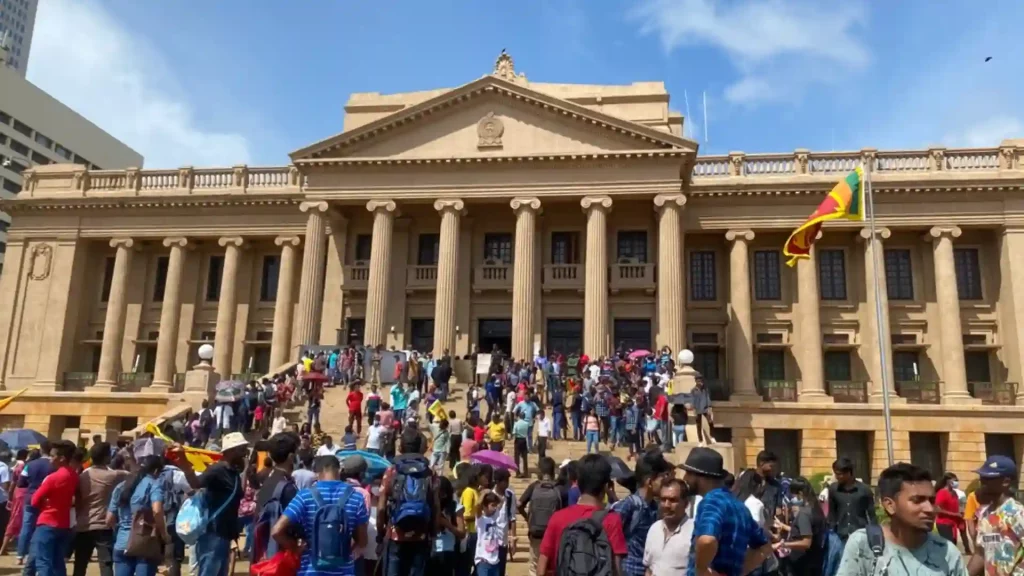Economic negligence coupled with the effects of Covid -19 pandemic rang the death bell for Sri Lanka and toppled the nation into the depths of deep financial turmoil
Sri Lanka slashes its benchmark interest rates for the first time in three years with the central bank targeting inflation cooling down to single digits, to support the country’s economic recovery after being dragged through political and economic instabilities. The Central Bank of Sri Lanka reduced the standard lending rates from 16.5% to 14% when the majority of the analyst estimates predicted the lending rates to remain unchanged.
Dragged through the worst!
Economic negligence coupled with the effects of Covid -19 pandemic rang the death bell for Sri Lanka and toppled the nation into the depths of deep financial turmoil. Sri Lanka was left severely short of dollars for essential imports at the beginning of last year pushing the nation to its worst crisis in decades. Severe shortages of essential items like medicine, food, and fuel again led to massive street protests that forced the then-president Rajapaksa to resign and ultimately flee the country.
A new government was formed and settled a $2.9 billion bailout from the International Monetary Fund (IMF) making it the 17th bailout for Sri Lanka since the country’s civil war ended which also lasted for several decades. The inflation rates are finally coming down from a record high of 70 percent in September. With this, the pressure on the nation’s balance of payments is also easing.
An attempt to pull up the economy
The Central Bank of Sri Lanka in a statement released mentioned that the monetary authority reached this decision to ease monetary conditions, falling in line with the faster-than-expected slowing of inflation, further anchoring of inflation expectations, and continuing dissipation of inflationary pressures.
“The commencing of such monetary easing is expected to provide an impetus for the economy to rebound from the historic contraction of activity witnessed in 2022, while easing pressures in the financial markets” read the statement. The official statement also mentioned that inflation continued on a deceleration path faster than expected with the support of tight monetary and fiscal policies, strengthening of Sri Lankan currency, reduction in fuel and gas prices, normalisation of food prices, and the favourable impact of the statistical base effect.
Earlier the monetary authority focused on the end of the year for single-digit inflation while the IMF wanted to see the target band of 4%-6% by early 2025. The government also aims to finish off the talks to restructure its bilateral debt with other countries by September. Senior vice president at Asia Securities in Colombo Sanjeewa Fernando expected that this could be an end to the crisis. P Nandalal Weerasinghe, the Governor, stated that the economy was getting back to normalcy.
Despite the analysts’ estimates of the interest rate staying steady, the current reduction stays at its lowest level since March 2022, the time when the crisis began. The decision, however, has created cheer in the markets with rupees rising to 288 against the dollar. The rate cut announcement comes after the Colombo Consumer Price Index rose 25.2 percent in a year compared with 35.3 percent in April, causing a reduction in the struggling economy.
The International Monetary Fund expects the GDP to contract by 3 percent after contracting nearly 7.8 percent last year. Weerasinghe said that the bank expects the economy to grow from the third quarter followed by a small contraction in the second quarter. “Hopefully banks will gradually expand their loan books and credit will start flowing into businesses and with that, the economy will start to recover,” stated Weerasinghe. The International Monetary Fund has set an inflation target of 15.2 percent for this year. When inflation decelerates faster and there is a lower probability of demand pressure during the economic rebound, which helps in creating a space for policy relaxation in the days ahead.
